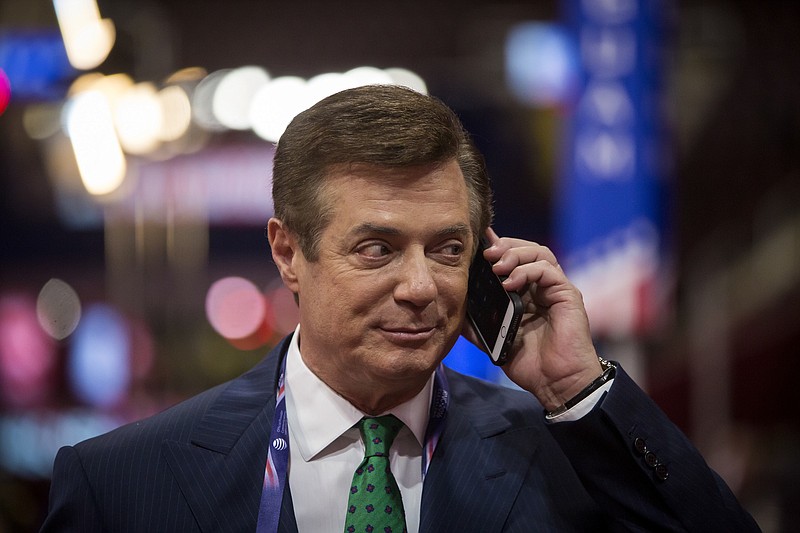Where was "extreme vetting" when Donald Trump brought Russia/Ukraine consultant Paul Manafort onto his campaign team?
Apparently the answer to that question depends on what you believe Trump meant when, in his so-called foreign policy speech Monday, he called for a new screening test that he labeled "extreme, extreme vetting," aimed at keeping out of our country anyone who does not share "American values" and who is not prepared to "embrace a tolerant American society."
Until such a test is ready, Trump said, the U.S. should suspend immigration from countries with histories of spawning terrorists.
So, now he seems to be talking not just a religious ban against Muslims, not just a Mexican immigrant ban, but now pretty much a free-speech ban - anyone who does not share our "values."
Whose values? Donald's? Melania's? Paul Manafort's?
Manafort, 67, worked to help elect Ukraine's former president Viktor Yanukovich and some other of the world's most notorious figures, including Philippine dictator Ferdinand Marcos and Angola guerrilla leader Jonas Savimbi. (And, yes, Manafort is said to have organized for Ronald Reagan, too).
Over the weekend, a New York Times story raised questions about possible secretive cash payments to Manafort for his work in Ukraine - a report Manafort dismissed as "silly."
When Kremlin puppet Yanukovich was ousted on Feb. 22, 2014, two months after protests flared in Kiev over his failure to sign a trade deal with EU, he fled to Vladimir Putin's Russia. A week later, pro-Russian gunmen seized government buildings in the capital of Ukraine's Crimea peninsula. In mid-March, Putin signed a law incorporating the oil-rich Crimea into Russia.
Now, according to The New York Times, Ukraine's newly formed National Anti-Corruption Bureau is examining secret records containing Manafort's name. The records indicate that about $12.7 million in cash payments were designated for him, as well as companies he sought business with. The Ukraine probe reportedly is trying to untangle a corrupt network investigators there say was used to loot Ukrainian assets and influence elections during the administration of Yanukovich, Manafort's main client - at least until Manafort resurfaced in America to "volunteer" on the Trump campaign.
Handwritten ledgers show cash payments for Manafort from Yanukovich's pro-Russian political party from 2007 to 2012. Investigators assert that the disbursements were part of an illegal off-the-books system whose recipients also included election officials.
Note the words "influence elections" and "election officials" in those Ukraine investigation descriptions.
Isn't it Donald Trump, who of late has been hinting that our election system "is rigged?"
And isn't it also Trump who's been having the bromance with Putin? Trump terms Putin a "strong leader" and keeps suggesting "wouldn't it be nice if we could be friends with Russia?"
It was Trump, too, who - after Russia government hackers broke into the Democratic National Committee computers to steal emails and opposition research on Trump - looked straight into television cameras and suggested Russia hack around to find "missing" Clinton emails that aren't missing at all. The personal Clinton emails were cataloged by the FBI from Clinton's server.
On July 30, The Guardian reported that since the DNC hack was leaked to WikiLeaks and became public, hacks against the Democratic Congressional Campaign Committee and the Clinton campaign also were reported. Again, signs pointed to Russian involvement.
The Guardian writes: "[E]xperts argue Vladimir Putin has attempted in the past to damage western democracy, saying Russian security agencies have made cyberattacks on French, Greek, Italian and Latvian targets during elections. In 2014, malware was discovered in Ukrainian election software that would have robbed it of legitimacy."
Alina Polyakova, deputy director of the Dinu Patriciu Eurasia Center at the Atlantic Council, told Guardian reporters: "We can't say 100 percent that Mr Putin had a hand in any of this but this kind of meddling in other countries' affairs is part of Russia's toolkit. It's a kind of asymmetric warfare. To me, this looks like something straight from the Russian secret service playbook, but I'm surprised at how brazen they've been."
And we must not forget the mystery of Trump's dismissal of NATO and his campaign's steamroll of the GOP platform plank on aid to the Ukraine. Instead of staying with a two-year-old Republican demand that the Obama administration provide a more robust response to Russia's incursions into Ukraine, the Trump campaign insisted a plank proposal for the U.S. to provide Ukraine "lethal defensive weapons" be changed to the more benign phrase "appropriate assistance."
On second thought, Trump - whose son in 2008 told a New York Russian real estate investors conference that "Russians make up a pretty disproportionate cross-section of a lot of our assets" - may have done exactly the "extreme vetting" he wanted in choosing Manafort to manage his campaign.
But what's the GOP's excuse for not doing its due diligence on Donald Trump?
